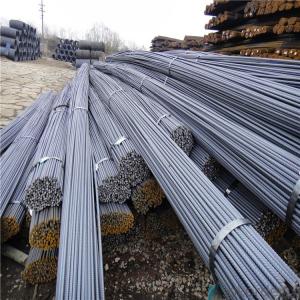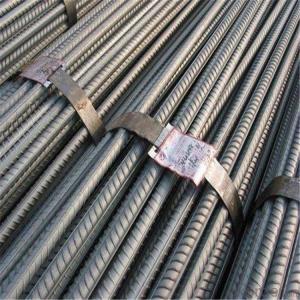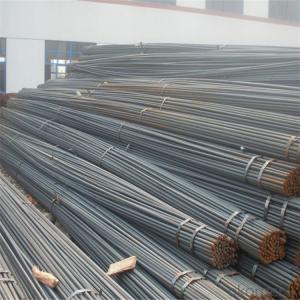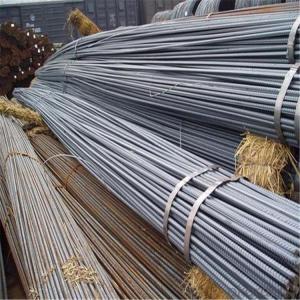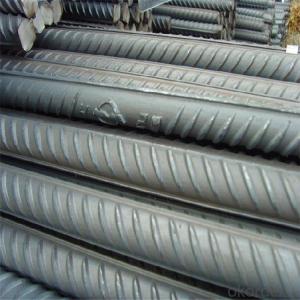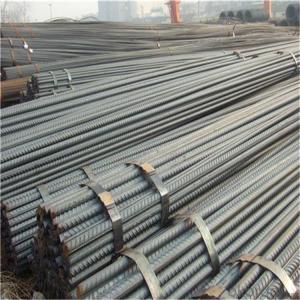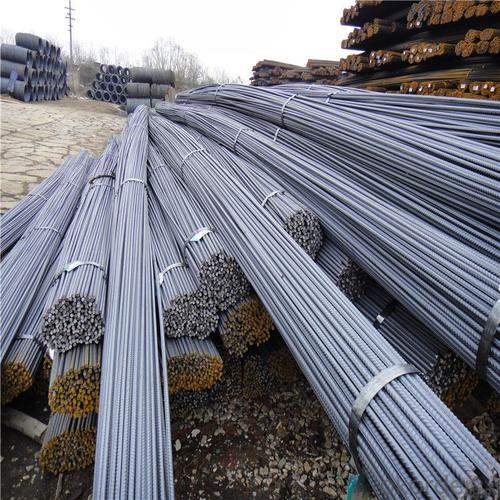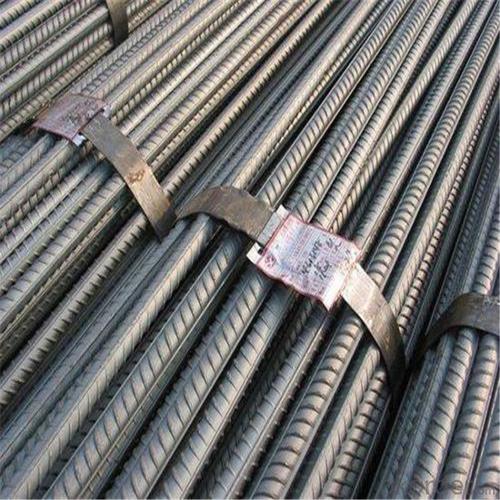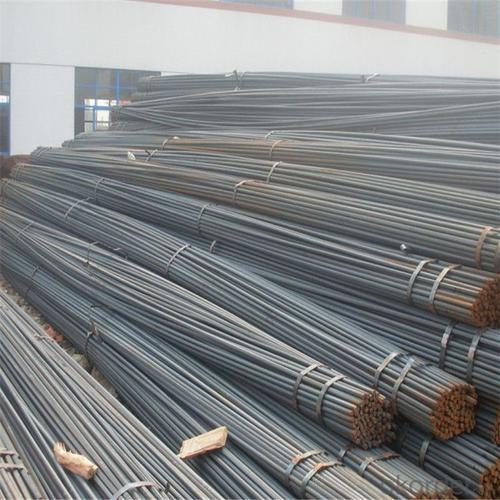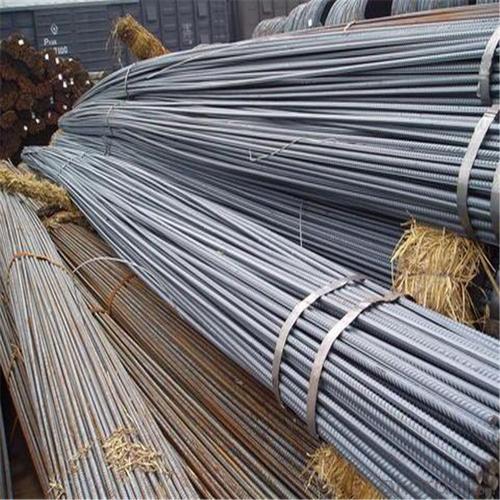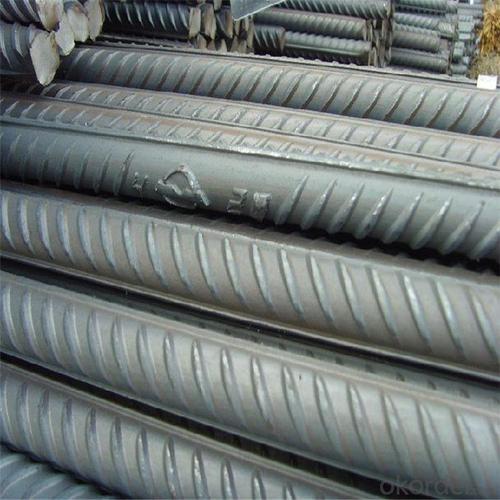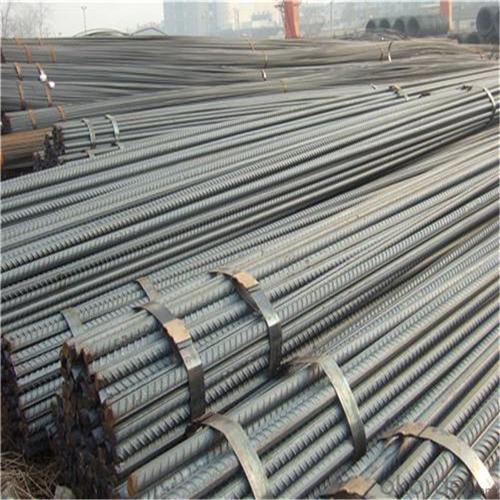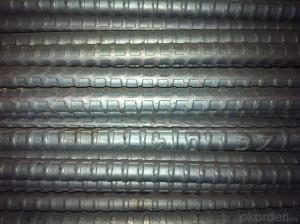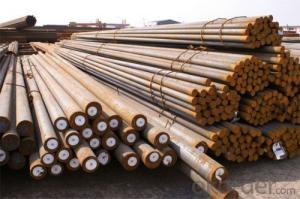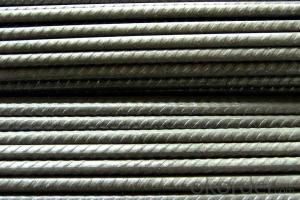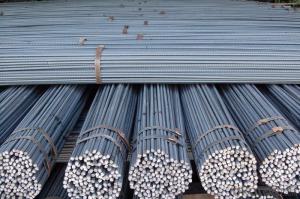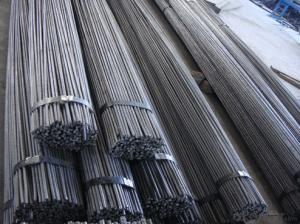Deformed Steel Bar 8mm 16mm 18mm 20mm 22mm 10mm
- Loading Port:
- Tianjin
- Payment Terms:
- TT OR LC
- Min Order Qty:
- 150 m.t.
- Supply Capability:
- 50000 m.t./month
OKorder Service Pledge
OKorder Financial Service
You Might Also Like
Specification
Deformed Steel Bar 8mm 16mm 18mm 20mm 22mm 10mm
Description of deformed steel bar 8mm 16mm 18mm 20mm 22mm 10mm
1, Diameter: 5.5mm-10mm deformed steel bar 8mm 16mm 18mm 20mm 22mm 10mm
10m- 40mm deformed steel bar 8mm 16mm 18mm 20mm 22mm 10mm
2, Length: 6m, 9m, 12m or customized
3, Standard: GB, ASTM, AISI, SAE, DIN, JIS, EN
OEM technology - send detailed technical parameters for accurate quotation.
2, Produce Process: smelt iron - EAF smelt billet - ESR smelt billet -
hot rolled or forged to get the steel round bar and plate
3, Heat Treatment: annealing, normalizing, tempering, quenching
4, Surface Treatment: Black
5, Quality Assurance: We accept third party inspection for all orders.
You can ask testing organizations such as SGS, BV, etc. to test our products before shipping.
Chemical Composition of deformed steel bar 8mm 16mm 18mm 20mm 22mm 10mm
Grade | Technical data of the original chemical composition(%) | |||||
Reinforcing steel bar HRB335 | C | Mn | Si | S | P | B |
≤0.25 | ≤1.60 | ≤0.80 | ≤0.045 | ≤0.045 | >0.0008 | |
Physics Capability | ||||||
Yield Strength(N/cm2) | Tensile Strength(N/cm2) | Elongation(%) | ||||
≥ 335 | ≥490 | ≥16 | ||||
Reinforcing steel bar HRB400 | C | Mn | Si | S | P | B |
≤0.25 | ≤0.16 | ≤0.80 | ≤0.045 | ≤0.045 | 0.04-0.12 | |
Physics Capability | ||||||
Yield Strength(N/cm2) | Tensile Strength(N/cm2) | Elongation(%) | ||||
≥ 400 | ≥ 570 | ≥ 14 | ||||
Products Show of deformed steel bar 8mm 16mm 18mm 20mm 22mm 10mm
Company Information
CNBM International Corporation is the most important trading platform of CNBM group.
Whith its advantages, CNBM International are mainly concentrate on Cement, Glass, Iron and Steel, Ceramics industries and devotes herself for supplying high qulity series of refractories as well as technical consultancies and logistics solutions.


F A Q
1, Your advantages?
professional products inquiry, products knowledge train (for agents), smooth goods delivery, excellent customer solution proposale
2, Test & Certificate?
SGS test is available, customer inspection before shipping is welcome, third party inspection is no problem
3, Factory or Trading Company?
CNBM is a trading company but we have so many protocol factories and CNBM works as a trading department of these factories. Also CNBM is the holding company of many factories.
4, Payment Terms?
30% TT as deposit and 70% before delivery.
Irrevocable L/C at sight.
5, Trading Terms?
EXW, FOB, CIF, FFR, CNF
6, After-sale Service?
CNBM provides the services and support you need for every step of our cooperation. We're the business partner you can trust.
For any problem, please kindly contact us at any your convenient time.
We'll reply you in our first priority within 24 hours.
- Q: What are the properties of nitrogen alloyed steel?
- Nitrogen alloyed steel typically exhibits improved strength, hardness, and corrosion resistance compared to regular carbon steel. It also has excellent wear resistance and may have enhanced toughness. Additionally, nitrogen alloying can improve the steel's ability to retain its properties at high temperatures, making it suitable for applications in challenging environments.
- Q: What are the specific requirements for special steel used in the textile industry?
- The specific requirements for special steel used in the textile industry are primarily related to its durability, corrosion resistance, and heat resistance. Due to the harsh conditions and high temperatures involved in textile processing, the steel used must be able to withstand these conditions without compromising its structural integrity. Firstly, the steel used in the textile industry must possess excellent durability. It should be able to withstand high mechanical stress, including tension, compression, and bending, without experiencing deformation or breakage. This is important as the machinery in the textile industry undergoes constant movement and repetitive actions. Corrosion resistance is another crucial requirement for special steel in the textile industry. The steel should be resistant to corrosion caused by chemicals, moisture, and other environmental factors. This is especially important as textile manufacturing processes often involve the use of various chemicals and water. Heat resistance is also vital for special steel in the textile industry. As the manufacturing processes involve high temperatures, the steel used must be able to withstand and maintain its strength and properties under these conditions. This ensures the longevity and efficiency of the equipment and machinery used in textile production. Additionally, the steel used in the textile industry should have excellent machinability. It should be easy to cut, shape, and form into various components and parts required for textile machinery. This allows for efficient manufacturing and customization of equipment as per specific needs. Furthermore, the steel may also need to meet specific standards and certifications set by regulatory bodies or industry organizations, ensuring that it meets the necessary quality and safety requirements. For instance, it may need to comply with international standards such as ISO 9001 for quality management systems. In summary, the specific requirements for special steel used in the textile industry include durability, corrosion resistance, heat resistance, machinability, and compliance with relevant standards. Meeting these requirements ensures that the steel can withstand the demanding conditions of textile manufacturing and contribute to the efficiency and reliability of the machinery involved.
- Q: How is high-strength stainless steel used in the production of structural components?
- High-strength stainless steel is used in the production of structural components due to its exceptional mechanical properties. Its high tensile strength, corrosion resistance, and durability make it an ideal material for constructing load-bearing parts such as beams, columns, and supports. Additionally, the stainless steel's ability to withstand harsh environments ensures the longevity and reliability of these structural components.
- Q: What are the main advantages of using special steel in the mining industry?
- The main advantages of using special steel in the mining industry are its high strength and durability, which make it capable of withstanding the harsh conditions and heavy loads associated with mining operations. Special steel also offers excellent resistance to corrosion, abrasion, and impact, ensuring a longer lifespan for mining equipment and reducing maintenance costs. Additionally, special steel's superior heat resistance and toughness make it suitable for high-temperature applications, such as smelting and refining processes.
- Q: What are the different machining techniques for special steel?
- There are several machining techniques that can be used for special steel, depending on the specific requirements and characteristics of the steel. Some common machining techniques include turning, milling, drilling, grinding, and broaching. Each technique has its own advantages and is chosen based on factors such as the desired shape, size, and surface finish of the steel component. Additionally, advanced techniques like electrical discharge machining (EDM) and laser cutting can be employed for special steel, offering precise and efficient machining solutions.
- Q: Can special steel be used in the production of kitchen utensils?
- Yes, special steel can be used in the production of kitchen utensils. Special steel, such as stainless steel, offers excellent durability, corrosion resistance, and hygiene, making it a popular choice for kitchen utensils. It can withstand high temperatures, resist staining, and is easy to clean, making it suitable for various cooking and food preparation tasks.
- Q: How does special steel contribute to improving product efficiency in energy-intensive processes?
- Special steel contributes to improving product efficiency in energy-intensive processes by providing enhanced strength, durability, and resistance to corrosion and wear. These properties allow for the development of more efficient machinery and equipment, reducing energy losses due to friction and wear. Additionally, special steel's high heat resistance enables the production of components that can withstand extreme temperatures, improving overall energy efficiency in processes such as high-temperature heat treatment or combustion. Moreover, its superior mechanical properties enable the construction of lighter and more compact designs, leading to reduced energy consumption during transportation and operation. Overall, special steel plays a vital role in optimizing energy-intensive processes by enhancing performance, longevity, and energy efficiency of products and equipment.
- Q: What are the properties of ultra-high-strength steel?
- Ultra-high-strength steel possesses exceptional mechanical properties, including high tensile strength, excellent toughness, and superior resistance to deformation, making it incredibly durable and robust. It exhibits remarkable load-bearing capabilities, enabling it to withstand heavy loads and extreme conditions without experiencing significant deformation or failure. Additionally, ultra-high-strength steel offers exceptional fatigue resistance, corrosion resistance, and the ability to maintain its structural integrity under high temperatures, making it an ideal material for demanding applications in industries such as aerospace, automotive, and construction.
- Q: How is special steel protected against corrosion?
- Special steel is protected against corrosion through various methods such as coating it with corrosion-resistant materials like zinc, nickel, or chromium, using cathodic protection techniques, applying protective paints or sealants, and employing proper maintenance practices like regular cleaning and inspections.
- Q: How is special steel used in the production of cutting inserts?
- The unique properties of special steel make it the ideal choice for producing cutting inserts. Cutting inserts are utilized in machining operations to shape and remove material from a workpiece. These inserts must possess the ability to endure high temperatures, resist wear and abrasion, and maintain their sharp cutting edges for extended periods. Commonly referred to as tool steel, special steel is specifically engineered to meet these requirements. It is an alloy that incorporates a variety of elements like chromium, tungsten, vanadium, and molybdenum, which enhance its mechanical properties. With its exceptional hardness, toughness, and resistance to high temperatures, special steel is a suitable material for cutting inserts. To further augment its properties, the special steel employed in manufacturing cutting inserts undergoes a series of processes, including heat treatment. This process involves subjecting the steel to specific temperatures and rapidly cooling it, resulting in increased strength and hardness. By undergoing heat treatment, the cutting inserts become capable of withstanding the extreme forces and temperatures encountered during machining operations. Moreover, special steel can be coated with materials like titanium nitride or diamond-like carbon to enhance its performance. These coatings contribute to the hardness, friction reduction, and overall wear resistance of the cutting inserts, ultimately extending their lifespan and improving efficiency. In conclusion, special steel is selected for the production of cutting inserts due to its remarkable hardness, toughness, high-temperature resistance, and wear resistance. These properties enable the cutting inserts to withstand the demanding conditions of machining operations and retain their sharp cutting edges for prolonged periods. As a result, material removal is carried out efficiently and precisely.
Send your message to us
Deformed Steel Bar 8mm 16mm 18mm 20mm 22mm 10mm
- Loading Port:
- Tianjin
- Payment Terms:
- TT OR LC
- Min Order Qty:
- 150 m.t.
- Supply Capability:
- 50000 m.t./month
OKorder Service Pledge
OKorder Financial Service
Similar products
Hot products
Hot Searches
Related keywords
